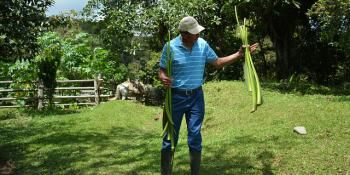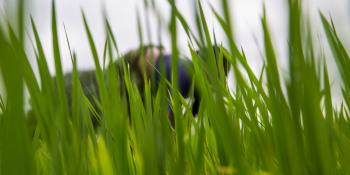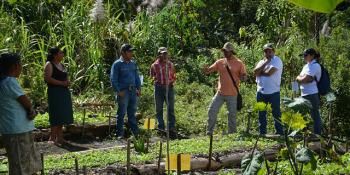Moulding climate champions; creating food secure communities
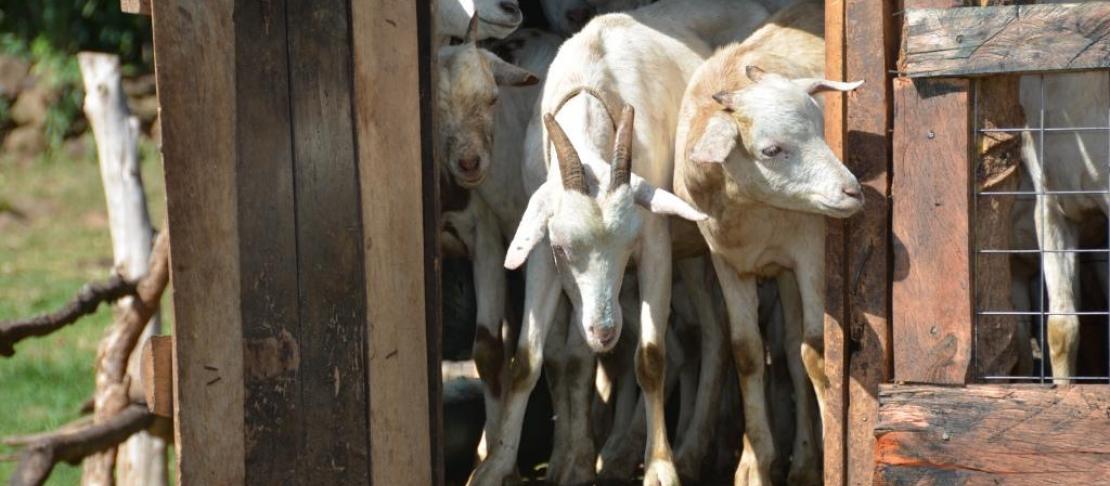
CCAFS East Africa, ILRI and other partners are working together to improve food security of local communities through better livestock management initiatives.
“Champions aren't made in gyms. They are made from something they have deep inside them: A desire, a dream, a vision. They must have the skill and the will. But the will must be stronger than the skill,” said Mohammed Ali, the world renowned American professional boxer.
Well, this article isn’t about Ali. It isn’t about sports either.
Meet Daniel Langat, a small-scale farmer and community livestock trainer in Tabet village, Kericho County within the Nyando Climate-Smart Villages (CSVs). Together with his wife, Esther, they manage a participatory goat breeding model in their homestead. Daniel is one of 50 champion farmers working with the CGIAR Research Program on Climate Change, Agriculture and Food Security (CCAFS), East Africa and partners to improve the productivity of small livestock in the Nyando Basin. This entails testing sheep and goat breeds that will adapt better to changing climatic conditions in the region. Other partners include World Neighbours, Kenya’s Ministry of Livestock, Agriculture and Fisheries (MALF) and most recently the International Livestock Research Institute (ILRI).
Daniel had a dream and a will to have a food secure household all year round. He now wants to see this reflected in his community. A baseline survey by CCAFS in the region in 2011 revealed that only one percent of households are food secure throughout the year; 81% experience difficulties in feeding their families from any source for one to two months each year while a further 17% are food insecure for three to four months annually. Although most farmers in the region have been adapting and making changes in their farming practices over the last ten years, very few, such as Daniel, have made livestock related management changes.
On 27 June, 2014, Daniel hosted his neighbors on his farm to learn about his goat project. This was during the annual farmer learning event held in the village that saw a total of 3,166 farmers visit champion farmers like Daniel to exchange ideas on local adaptation practices geared towards generating higher income and improving food security under a changing climate. The majority of the participants were women (62%) while 38% were men. This participation is triple that of the year 2013, reflecting an increased interest in farmer engagement in climate-smart agriculture innovations.
As a member of a community whose livelihood is dependent almost entirely on livestock and to a little extent on crops, Daniel's neighbors were interested to learn about his goats and why he got so much milk and meat within a short period of time. However, according to Daniel and his wife, this has not always been the case.
“I started with three east African goats on my farm in the year 2002. Through breeding with other local goats in the village, my goat population increased but I still faced major challenges: milk production was quite low and these goats did not fetch good prices in the market” said Daniel to his neighbors.
In 2008 however, he purchased a male gala goat for breeding with the east African goats to improve their traits and productivity.
“A lot of in-breeding between the east African goats in this area has resulted to smaller sized animals that do not fetch the farmer good market prices. Gala goats have desirable traits of faster maturity and higher milk production. They also fetch good prices in the market” said George Nandi, a livestock extension officer from MALF who works closely with farmers like Daniel.
A mature gala goat costs between Sh 5,000 (approximately USD 57) to Sh 8,000 (USD 92) while the east African goats cost Sh 2,500 (USD 29) to Sh 3,000 (USD 34).
Inspired by the work of Daniel in his village, in 2011, CCAFS selected him to be a champion farmer to help reach out to the rest of the community. Supported by researchers, government extension officers and non-governmental organizations such as World Neighbors, Daniel set up a goat breeding model that has so far led to over 500 goat cross breeds in the village. His herd now includes 30 improved breeds (crosses of the gala and the east African goats), 15 kids and two local goats. The participatory goat breeding model will reach over 10,000 farmers within a year. The annual farmer learning event was one of the avenues to promote learning and knowledge sharing in the village.
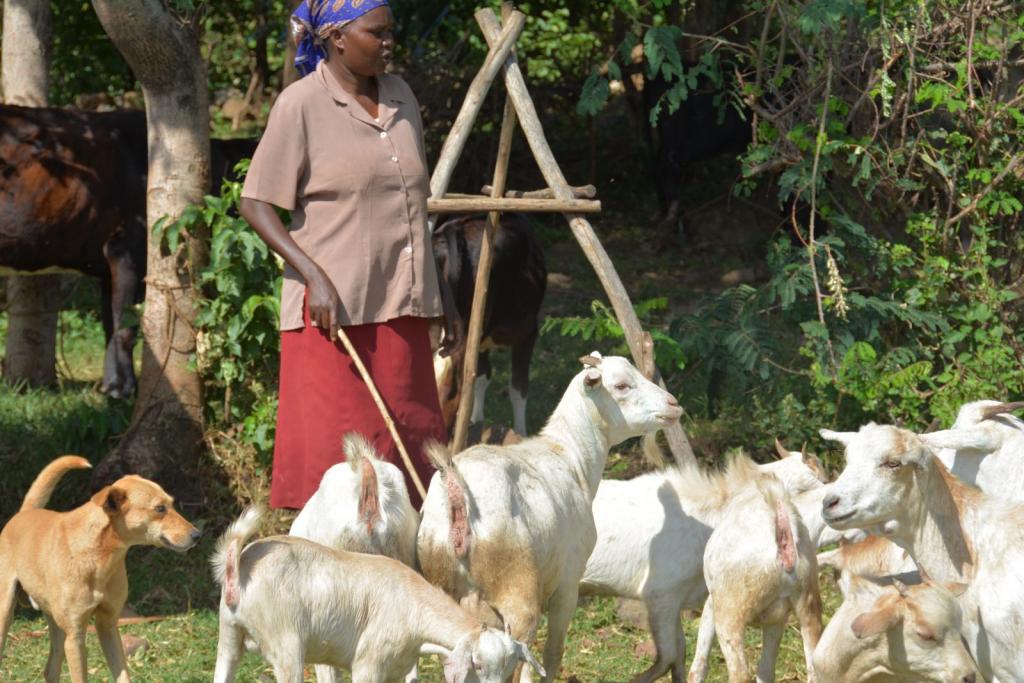
Esther langat herds her improved goats. PHOTO: V.ATAKOS (CCAFS)
“I now comfortably pay fees for my children from the sale of the goats. Additionally, the milk is quite nutritious especially to my children who consume it on a daily basis” said Daniel to the group of farmers on his farm.
Following the field visit, all farmers including Daniel and other members of Kapsokale Community Based Organization met up to discuss how to move forward towards a food secure community. In attendance was the area Member of Parliament Honorable Justice Kemei, the area Chief, his assistant and a number of children from Kaplelartet Primary School who are engaged in tree planting activities in the area as a way of fighting climate change. Others included research and development partners and private sector entrepreneurs.
“Agriculture is the main source of income in this constituency and we must adopt climate friendly agricultural innovations in order to achieve a food secure community. I will ensure you have access to necessary amenities such as water and agricultural inputs” said Hon J Kemei. He further acclaimed CCAFS way of working in the region through partnerships and called for a replication of the learning event in other villages in the constituency.
CCAFS and partners will continue working in the area to improve productivity of small ruminants. A new program with ILRIs Animal Science for Sustainable Productivity (AASP) program seeks to sustainably improve livelihoods of small-holder farmers, such as Daniel, in the region by increasing their incomes and food security through sustained uptake of improved Small Ruminant (SR) breeding programs under changing climatic conditions.
Expected outcomes of this project include: improved production and productivity of SR under small-holder production systems in Eastern Africa; improved market access and commercialization of SR production under small-holder systems; improved ecosystem productivity and management within the CSVs. Finally, the project will see improved capacity of small-holder farmers, both men and women, and of development partners to manage and monitor sustainable SR productivity in CSVs.
Learn more
Meet other climate champions in Nyando:
Hybrid seeds and super goats: meet Kenya's future farmers
Photo-story: Kenya's climate-smart farms through a lens
Phillip Kimeli, Solomon Kilungu and Vivian Atakos work for CCAFS East Africa.

